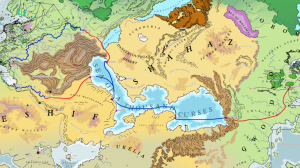Difference between revisions of "Great Silk Highway"
Trismegistus (talk | contribs) m |
Trismegistus (talk | contribs) m |
||
| Line 1: | Line 1: | ||
| − | The Great Silk Highway is a merchant route between the [[West]], specifically the [[Pallathantic Region]] and the [[East]], specifically [[Gwo-Dao]] and [[Sungo]]. This route began to be used heavily in the first millennium before [[Salmakhamer]] for the exchange of silk and gold, and became even more greatly used in the first millennium after Salmakhamer when the [[Tangshan]]ians developed a superior method of producing silk known as '[[skysilk]]' which was excellent for [[skycraft]] and [[windships]]. The route was used during the Middle Ages when the secret to fine skysilk was successfully imitated in the [[West]]. Despite the local production of skysilk, western skycraft manufacturers in the late Middle Ages continued to commerce with the far east on account of the higher quality and relatively cheaper cost of [[Gwo-Dao]]ish skysilk and for other wares of the far east, including [[euphorium]] and [[Pamnests]]. There is also a so-called 'Great Silk Skyway' which passes to the north of [[Shahaz]] by means of skycraft and, in modern times, [[titanship]]s. | + | The Great Silk Highway is a merchant route between the [[West]], specifically the [[Pallathantic Region]] and the [[East]], specifically [[Gwo-Dao]] and [[Sungo]]. This route began to be used heavily in the first millennium before [[Salmakhamer]] for the exchange of silk and gold, and became even more greatly used in the first millennium after Salmakhamer when the [[Tangshan]]ians developed a superior method of producing silk known as '[[skysilk]]' which was excellent for [[skycraft]] and [[windships]]. The route was used during the Middle Ages when the secret to fine skysilk was successfully imitated in the [[West]]. Despite the local production of skysilk, western skycraft manufacturers in the late Middle Ages continued to commerce with the far east on account of the higher quality and relatively cheaper cost of [[Gwo-Dao]]ish skysilk and for other wares of the far east, including [[euphorium]] and [[Pamnests]]. There is also a so-called 'Great Silk Skyway' which passes to the north of [[Shahaz]] by means of skycraft and, in modern times, [[titanship]]s. The surface route of the Silk Highway remains well trodden and sailed even since the advent of skycraft, for the great seabarges of the [[Sea of a Thousand Curses]] can haul much heavier loads of silk and crops than the flying vessels. |
[[File:MapGreatSilkHighway.png|thumb|300px|The route of the Great Silk Highway begins in Zamzafara at the mouth of the [[Thybdis River]] and ends in [[Gwo-Dao]], typically the great capital of [[Kwang Mei]].]] | [[File:MapGreatSilkHighway.png|thumb|300px|The route of the Great Silk Highway begins in Zamzafara at the mouth of the [[Thybdis River]] and ends in [[Gwo-Dao]], typically the great capital of [[Kwang Mei]].]] | ||
Latest revision as of 14:21, 28 December 2024
The Great Silk Highway is a merchant route between the West, specifically the Pallathantic Region and the East, specifically Gwo-Dao and Sungo. This route began to be used heavily in the first millennium before Salmakhamer for the exchange of silk and gold, and became even more greatly used in the first millennium after Salmakhamer when the Tangshanians developed a superior method of producing silk known as 'skysilk' which was excellent for skycraft and windships. The route was used during the Middle Ages when the secret to fine skysilk was successfully imitated in the West. Despite the local production of skysilk, western skycraft manufacturers in the late Middle Ages continued to commerce with the far east on account of the higher quality and relatively cheaper cost of Gwo-Daoish skysilk and for other wares of the far east, including euphorium and Pamnests. There is also a so-called 'Great Silk Skyway' which passes to the north of Shahaz by means of skycraft and, in modern times, titanships. The surface route of the Silk Highway remains well trodden and sailed even since the advent of skycraft, for the great seabarges of the Sea of a Thousand Curses can haul much heavier loads of silk and crops than the flying vessels.

Route of the Great Silk Highway
The route of the Great Silk Highway historically began in Zamzafara by sea-barge and proceeded up the Thybdis River to Nahwa Luva, where the merchants would unload their waves onto galimshara caravarans and journey over the Gontarine Highlands which pass to the east of the Adamantine Mountains and thence over the narrow land between those mountains and the Amshoori Sea called the Wyvern Shore. Then the route passes through the western edge of the Danzercouphtan Desert to the trade town of Karka Zehir on the coast of the great Sea of a Thousand Curses. At this seaport, the wares are transferred from galimshara to sea-barges and the route continues through the long course of the sea, occasionally stopping at autonomous coastal seaports until it reaches Gwam-Pho-Thar on the far eastern shore. Here merchants transfer their wares for the last time to galimshara and proceed into one of the many great cities of Gwo-Dao.
See Also
- Great Silk Skyway
- Pallathantic Region
- Pallathantic Sea
- Sea of a Thousand Curses
- Shahaz
- Skysilk
- Wyvern Shore
- Zamzafara
| This article is a stub. It requires further development by the creator. |